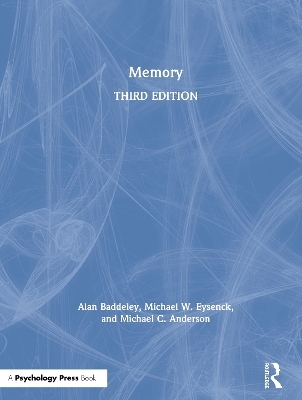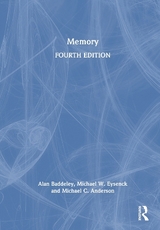
Memory
Routledge (Verlag)
978-1-138-32607-1 (ISBN)
- Titel erscheint in neuer Auflage
- Artikel merken
The third edition of Memory provides students with the most comprehensive introduction to the study of human memory and its applications in the field. Written by three leading experts, this bestselling textbook delivers an authoritative and accessible overview of key topic areas.
Each chapter combines breadth of content coverage with a wealth of relevant practical examples, whilst the engaging writing style invites the reader to share the authors’ fascination with the exploration of memory through their individual areas of expertise. Across the text, the scientific theory is connected to a range of real-world questions and everyday human experiences. As a result, this edition of Memory is an essential resource for those interested in this important field and embarking on their studies in the subject.
Key features of this edition:
it is fully revised and updated to address the latest research, theories, and findings;
chapters on learning, organization, and autobiographical memory form a more integrated section on long-term memory and provide relevant links to neuroscience research;
it has new material addressing current research into visual short-term and working memory, and links to research on visual attention;
it includes content on the state-of-play on working memory training;
the chapter on “memory across the lifespan” strengthens the applied emphasis, including the effects of malnutrition in developing nations on cognition and memory.
The third edition is supported by a Companion Website providing a range of core resources for students and lecturers.
Alan Baddeley is Professor of Psychology at the University of York, UK. Michael W. Eysenck is Professor Emeritus in Psychology and Honorary Fellow at Royal Holloway, University of London. He is also a Professorial Fellow at the University of Roehampton, UK. Michael C. Anderson is Senior Scientist and Programme Leader at the MRC Cognition and Brain Sciences Unit, University of Cambridge, UK.
1. What is Memory?
2. Memory and the Brain
3. Short-term Memory
4. Working Memory
5. Learning
6. Episodic Memory: Organizing and Remembering
7. Semantic Memory and Stored Knowledge
8. Retrieval
9. Incidental Forgetting
10. Motivated Forgetting
11. Autobiographical Memory
12. Eyewitness Testimony
13. Prospective Memory
14. Memory Across the Lifespan: Growing Up
15. Memory and Aging
16. When Memory Systems Fail
17. Improving Your Memory
| Erscheinungsdatum | 01.04.2020 |
|---|---|
| Zusatzinfo | 2 Tables, color; 173 Line drawings, color; 55 Halftones, color; 228 Illustrations, color |
| Verlagsort | London |
| Sprache | englisch |
| Maße | 189 x 246 mm |
| Gewicht | 1620 g |
| Themenwelt | Geisteswissenschaften ► Psychologie ► Allgemeine Psychologie |
| Geisteswissenschaften ► Psychologie ► Biopsychologie / Neurowissenschaften | |
| Geisteswissenschaften ► Psychologie ► Entwicklungspsychologie | |
| Geisteswissenschaften ► Psychologie ► Verhaltenstherapie | |
| Naturwissenschaften ► Biologie ► Humanbiologie | |
| Naturwissenschaften ► Biologie ► Zoologie | |
| ISBN-10 | 1-138-32607-0 / 1138326070 |
| ISBN-13 | 978-1-138-32607-1 / 9781138326071 |
| Zustand | Neuware |
| Informationen gemäß Produktsicherheitsverordnung (GPSR) | |
| Haben Sie eine Frage zum Produkt? |
aus dem Bereich



